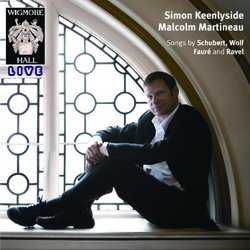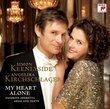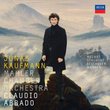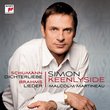| All Artists: Simon Keenlyside Title: Songs by Schubert, Wolf, Faure and Ravel Members Wishing: 0 Total Copies: 0 Label: Wigmore Hall Live Original Release Date: 1/1/2009 Re-Release Date: 9/29/2009 Genres: Pop, Classical Styles: Vocal Pop, Chamber Music, Historical Periods, Classical (c.1770-1830) Number of Discs: 1 SwapaCD Credits: 1 |
Search - Simon Keenlyside :: Songs by Schubert, Wolf, Faure and Ravel
 | Simon Keenlyside Songs by Schubert, Wolf, Faure and Ravel Genres: Pop, Classical
|
Larger Image |
CD DetailsSimilar CDs |
CD ReviewsKeenlyside Wigmore Hall recital John Palik | Iowa City, IA United States | 03/09/2010 (5 out of 5 stars) "Songs by Schumann, Wolf, Faure and Ravel It would be hard to overpraise this recital disc, as it catches Simon Keenlyside's vocal prowess in full bloom. His German and French diction could not be bettered, and his warm, resonant tone is shown to best advantage in this varied recital of Schubert, Wolf, Faure, and Ravel songs. SK spins out breath-taking (to the listener) long lines, unbroken no matter what the dynamic, and holds high the blue flower of Romanticism in unmatched style in both the Schubert and Faure selections, as well as displaying great humor in some of the Wolf and Ravel songs. The perfect poise of his phrasing is matched by the superb pianism of his accompanist, Malcolm Martineau." Don't download. L. Grenville | nyc | 02/14/2010 (1 out of 5 stars) "I just tried downloading one of the Schubert songs and what should have been Simon Keelyside was, indeed, Wolfgang Holzmair. SO, don't download if you're expecting the masterful Mr. K." Keenlyside in a Wonderful Recital (Live) at Wigmore G P Padillo | Portland, ME United States | 04/28/2010 (5 out of 5 stars) "I've been giving another listen to Simon Keenlyside's wonderful Wigmore Hall recital with pianist Malcolm Martineau, given on 26 October 2008 and what a joyous celebration of song this recital is.
Opening with a set of Schubert that is not without a couple of flaws here and there, Keenlyside takes risks that seem uncommon today to recitalists today, seemingly shading texts and lines with something that approaches equal part musician and singing actor. There is a touch of huskiness when he approaches head voice that I`m sure will drive some listeners running. For some this sort of thing simply will not do, but for those who love genuine interpretive singing those blemishes seem actually to enhance the text. Schubert's "Verklärung" (Transfiguration), which begins with a rather grand operatic recitative before segueing into its gentle lied the baritone alternates between almost painfully beautiful tone to hushed, slightly rasped sound . . . but with the text "let me dwindle away gently," such an effect is (to these ears) not only welcome, but raises the song to something beyond the beautiful noise that many lieder singers - and audiences - seem satisfied with. The following "Die Sterne" has a lilting, almost dance-like quality . . . and so it goes, throughout with Keenlyside making the most of every line of text, wedding it beautifully with the music and unafraid to change the tone from robust to delicate. His observations to appogiatura, turns is exemplary in each song. The Schubert set ends with that old chestnut (which seems rarely heard anymore) "Ständchen" - as lovely as I've heard in a very long time - and seemingly the audience as well as I can rarely recall a first set of a recital ending with cheers as well as applause. Even better is the set of six Wolf lieder, though moments of the first "Der Knabe und das Immlein" have a couple of intonation and tonal issues which, as the singer portrays the song's several characters sound as if they threaten to lose control. Immediately on its heels however follow absolutely gorgeous readings of "Gesang Weylas" and "An die Geliebte" that are positively swoon--inducing. The best of the Wolf, however is grandly theatrical "Lied vom Winde" which ends with Keenlyside saying his goodbye as if he's floating away himself. It is nothing short of brilliant musicmaking and word painting, which is what this sort of thing is all about anyway, ja? The singer really excels at programming for each set seems to move from strength to strength and the Wolf is followed by eight gems by Fauré. His French sounds (to me anyway) near perfection, and the colors in his voice match the composer's requirements. Again, here Keenlyside show a fearlessness with an ability to float in some head voice - usually to exquisite effect. In "En sourdine" - the richness of his voice blends to stunning effect with a natural leaning into the nasality of the language that . . . well, here comes that word again . . . "exquisite." If he does not break your heart in "Spleen" . . . see a doctor, it may not be fixable. I tend to love the Fauré the most, but really, Simon's best singing comes in the Ravel that closes the recital. Here, the most beautiful part of his voice - the middle - is allowed to shine more than in any other portion of the recital. As elsewhere, Keenlyside's attention to textures and word painting is captivating and "freed" (if that's the right word) from the rhythmic structure of more standard poetry verse, his reaching for dramatic effects is more welcome than - even using straight tone and other vocal "effects" to maximize the wedding of word to music. Simon gets a nice little laugh announcing his encore, Poulenc's "Hotel" - but no laughs from the beautiful rendition he closes the recital with. Throughout the entire program, Mr. Martineau proves to be an absolutely compelling partner to the singer, the two seemingly breathing every phrase and nuance in tandem. Even more remarkably, Martineau seems to sense what appear to be "on the spot" (though this is clearly the work of a well rehearsed team) sudden changes, as when the singer suddenly produces an instant - and ravishing diminuendo - the piano subsides immediately, giving a sense of spontaneity both rare and wonderful. For lovers of classic style vocal recitals, this is a must have and I can't imagine ANY fan of this wonderful singer being without this release. Get it. Seriously." |

 Track Listings (27) - Disc #1
Track Listings (27) - Disc #1


